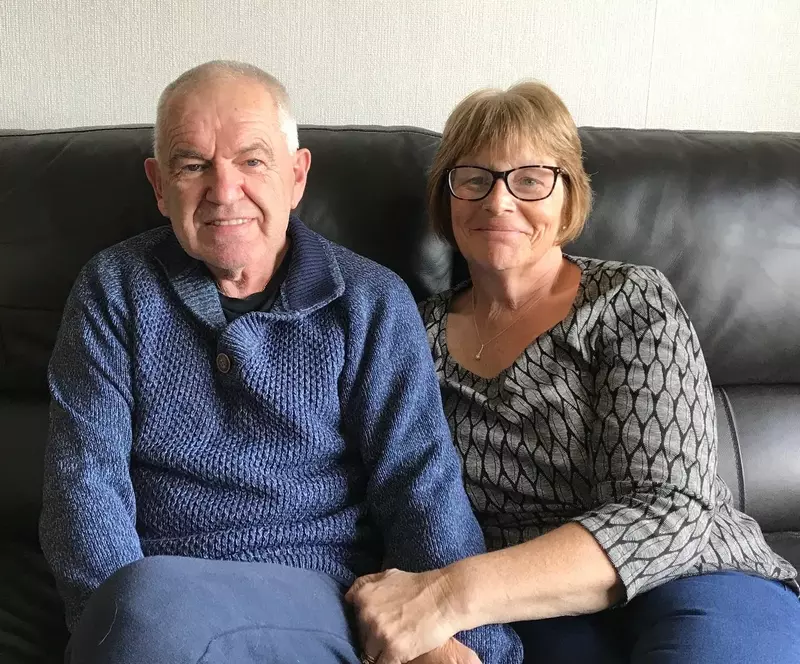New trial of anti-sickness pill to combat hallucinations in Parkinson’s
Now closed to recruitment: The TOP HAT study will test whether ondansetron, an anti-sickness pill already used in the NHS, can help to reduce visual hallucinations in people with Parkinson’s or Lewy body dementia (LBD).
Quick summary if you’re in a hurry:
- Hallucinations affect many people with Parkinson’s at some point and can be extremely distressing for patients and their families.
- Current treatment options for managing hallucinations in people with Parkinson’s are severely limited.
- A major new trial, the TOP HAT study, will test whether a currently available anti-sickness drug could help relieve visual hallucinations.
Visual hallucinations are when people see things that aren’t there. They are probably more commonly associated with mental health conditions like schizophrenia, but may affect up to 75% of people with Parkinson’s at some point during the condition. Read more about hallucinations and Parkinson's on the National Library of Medicine website.
Visual hallucinations may be subtle. We probably all have moments when we think we’ve seen something out of the corner of our eye but when we turn to look realise there’s nothing there.
And that’s how things can start for people with Parkinson’s or Lewy body dementia (LBD). But for some, hallucinations can become much more vivid and troublesome.
Susan and Andy live in Dorset with their daughter. Andy was diagnosed with Parkinson’s at 41. He’s now 66 and living with Parkinson’s and dementia. Andy first started having hallucinations about 12 years after he was diagnosed with Parkinson’s.

"For a year, he was smelling smoke and I would be running around to find the source but there was nothing," explains Susan.
"A few months ago, one early morning, he woke up at 2am and was fully dressed to go outside to see, what he thought, was the milking parlour. I took him outside and he said he could see cows on the farm.
"The hallucinations have definitely become worse since lockdown. His routine has completely changed and that’s affected his symptoms.
"It really is the worst thing to cope with. He sees insects like wasps and mice on the bedroom floor almost every day, particularly in the evening.
"Andy gets really scared and I’ve tried to explain things to him but it gets so draining. It is really, really important we find a treatment to treat hallucinations in people with Parkinson’s. It can be so distressing for people like Andy and the carer."
Read more about hallucinations and delusions on our website.
About the TOP HAT study
Ondansetron is an anti-sickness drug that is already approved and in use in the UK, mainly to help reduce nausea in people undergoing cancer treatment.
Ondansetron affects visual processing in the brain and its potential for treating visual hallucinations in Parkinson’s was first identified in studies in the early 1990s. At the time, the high cost of ondansetron prevented further studies but it is now affordable.
Parkinson’s UK is now funding a large-scale clinical trial to investigate ondansetron in people with Parkinson’s or Lewy body dementia (LBD) who experience moderate to severe visual hallucinations. This means experiencing troubling visual hallucinations on at least a weekly basis.
The trial is now closed to new participants. The latest update on the TOP HAT study can be found on our research news pages.
Driving forward a new treatment for hallucinations
Research suggests that up to 75% of people with Parkinson’s may experience hallucinations at some point.
In a recent survey conducted by Parkinson’s UK and researchers at the University of Lancaster, 1 in 10 respondents reported that hallucinations had worsened during the COVID-19 pandemic.
There are currently no specific treatments approved in the UK for people with Parkinson’s who experience hallucinations.
Current management for psychotic symptoms includes:
- reducing Parkinson’s medications which can trigger or worsen psychotic symptoms. However, this can mean other Parkinson’s symptoms worsen.
- antipsychotic drugs. However, these medications may worsen Parkinson’s symptoms and can have serious risks and side effects.
If this new phase 2 trial provides evidence that ondansetron is safe and effective it could rapidly be made available to people with Parkinson’s or Lewy body dementia (LBD) on the NHS without the need for further studies.
"Visual hallucinations pose a particular challenge in Parkinson’s as the very treatments for motor symptoms in Parkinson’s can also trigger and worsen this distressing symptom. Finding treatments for hallucinations that are both effective and safe is an area of great unmet need.
"This trial will enable us to find out if ondansetron is effective and safe as a treatment and if it is, we could see clinicians prescribing an inexpensive drug with fewer side effects to people with Parkinson’s throughout the UK."Lead Researcher, Suzanne Reeves, Professor of Old Age Psychiatry and Psychopharmacology at UCL
Donate to research
Will you donate £15 to help fund research towards better treatments and a cure for Parkinson's? Donate to research today.

